(完整word版)初中英语时间方位介词
- 格式:doc
- 大小:329.02 KB
- 文档页数:18
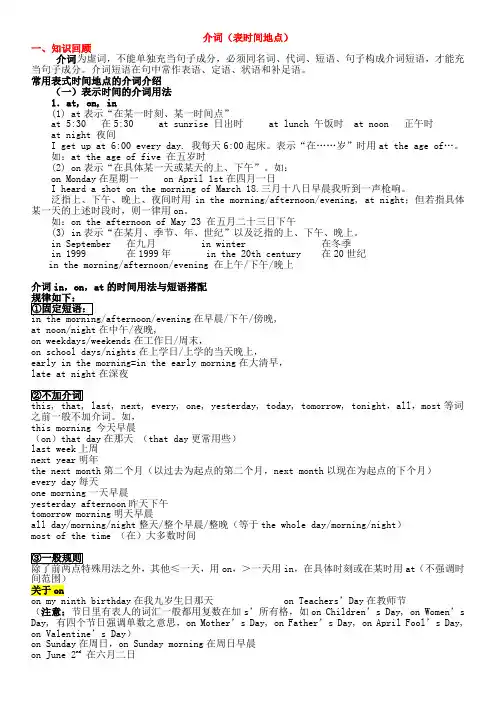
介词(表时间地点)一、知识回顾介词为虚词,不能单独充当句子成分,必须同名词、代词、短语、句子构成介词短语,才能充当句子成分。
介词短语在句中常作表语、定语、状语和补足语。
常用表式时间地点的介词介绍(一)表示时间的介词用法1.at, on, in(1) at表示“在某一时刻、某一时间点”at 5:30 在5:30 at sunrise 日出时 at lunch 午饭时 at noon 正午时at night 夜间I get up at 6:00 every day. 我每天6:00起床。
表示“在……岁”时用at the age of…。
如:at the age of five 在五岁时(2) on表示“在具体某一天或某天的上、下午”。
如:on Monday在星期一 on April 1st在四月一日I heard a shot on the morning of March 18.三月十八日早晨我听到一声枪响。
泛指上、下午、晚上、夜间时用in the morning/afternoon/evening, at night;但若指具体某一天的上述时段时,则一律用on。
如:on the afternoon of May 23 在五月二十三日下午(3) in表示“在某月、季节、年、世纪”以及泛指的上、下午、晚上。
in September 在九月in winter 在冬季in 1999 在1999年 in the 20th century 在20世纪in the morning/afternoon/evening 在上午/下午/晚上介词in,on,at的时间用法与短语搭配在早晨/下午/傍晚,at noon/night在中午/夜晚,on weekdays/weekends在工作日/周末,on school days/nights在上学日/上学的当天晚上,early in the morning=in the early morning在大清早,late at night在深夜,all,most等词之前一般不加介词。
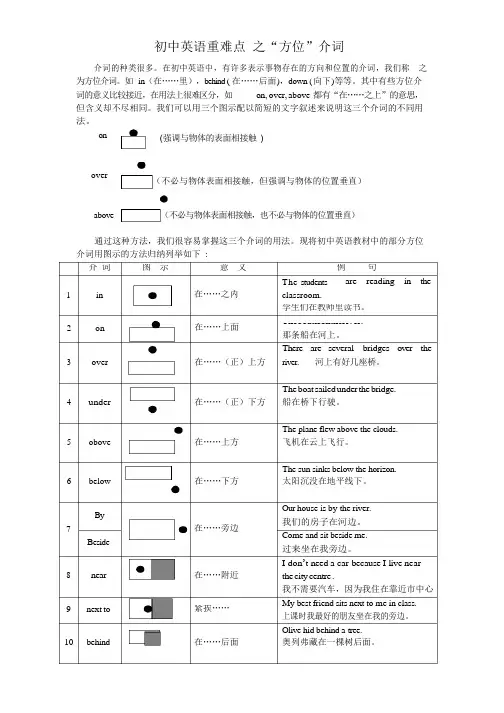
介词图示意义例句The students classroom.are reading in the1in在……之内学生们在教师里读书。
over theBy7在……旁边Beside8near在……附近9 next to紧挨……10 behind在……后面Our house is by the river.我们的房子在河边。
Come and sit beside me.过来坐在我旁边。
I don’t need a car because I live near the city centre .我不需要汽车,因为我住在靠近市中心My best friend sits next to me in class.上课时我最好的朋友坐在我的旁边。
Olive hid behind a tree.奥列弗藏在一棵树后面。
初中英语重难点之“方位”介词介词的种类很多。
在初中英语中,有许多表示事物存在的方向和位置的介词,我们称之为方位介词。
如in(在……里),behind ( 在……后面),down ( 向下)等等。
其中有些方位介词的意义比较接近,在用法上很难区分,如on, over, above 都有“在……之上”的意思,但含义却不尽相同。
我们可以用三个图示配以简短的文字叙述来说明这三个介词的不同用法。
on (强调与物体的表面相接触)over(不必与物体表面相接触,但强调与物体的位置垂直)above (不必与物体表面相接触,也不必与物体的位置垂直)通过这种方法,我们很容易掌握这三个介词的用法。
现将初中英语教材中的部分方位介词用图示的方法归纳列举如下:2onTheboatisontheriver.在……上面那条船在河上。
3over在……(正)上方There are several bridges river. 河上有好几座桥。
4under在……(正)下方The boat sailed under the bridge.船在桥下行驶。
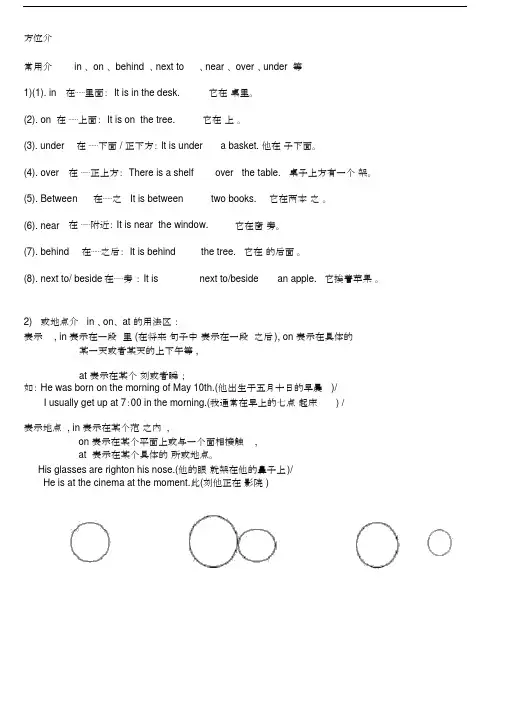
方位介常用介in 、 on 、 behind 、next to 、near 、 over 、under 等1)(1). in 在⋯⋯里面: It is in the desk. 它在桌里。
(2). on 在⋯⋯上面: It is on the tree. 它在上。
(3). under 在⋯⋯下面 / 正下方: It is under a basket. 他在子下面。
(4). over 在⋯⋯正上方: There is a shelf over the table. 桌子上方有一个架。
(5). Between 在⋯⋯之 It is between two books. 它在两本之。
(6). near 在⋯⋯附近: It is near the window. 它在窗旁。
(7). behind 在⋯⋯之后: It is behind the tree. 它在的后面。
(8). next to/ beside在⋯⋯旁:It is next to/beside an apple. 它挨着苹果。
2)或地点介 in 、on、 at 的用法区:表示 , in 表示在一段里 (在将来句子中表示在一段之后), on 表示在具体的某一天或者某天的上下午等 ,at 表示在某个刻或者瞬;如: He was born on the morning of May 10th.(他出生于五月十日的早晨)/I usually get up at 7:00 in the morning.(我通常在早上的七点起床) /表示地点 , in 表示在某个范之内 ,on 表示在某个平面上或与一个面相接触,at 表示在某个具体的所或地点。
His glasses are righton his nose.(他的眼就架在他的鼻子上)/He is at the cinema at the moment.此(刻他正在影院 )B A B A B AB 在 A 里——用in A 和B 相(接壤)——用on A 和B 不相(不接壤)——用to3) in front of “在⋯之前”(范外)in the front of 表示“在⋯的前部”(范内)演1. The United States is ____ the south of Canada and ___ the east of Japan.A. to; inB. on; toC. in; besideD. at; on2 . Japan lies____ the east of China.A. on B/ to C. in D. with3. Jiangsu is___ the east of China, but Japan is ___ the east of China.A. to; inB. in; to .C. on; toD. to; on4.There are some trees_________ the classroomThere is a blackboard ____________ the classroom.5.—Look, there are many apples ______ the tree.—Yes. And a boy is picking apples ______ the tree now.A. in; onB. on; inC. in; inD. on; on6.When did you arrive ______school this morning?A. inB. atC. toD. with。
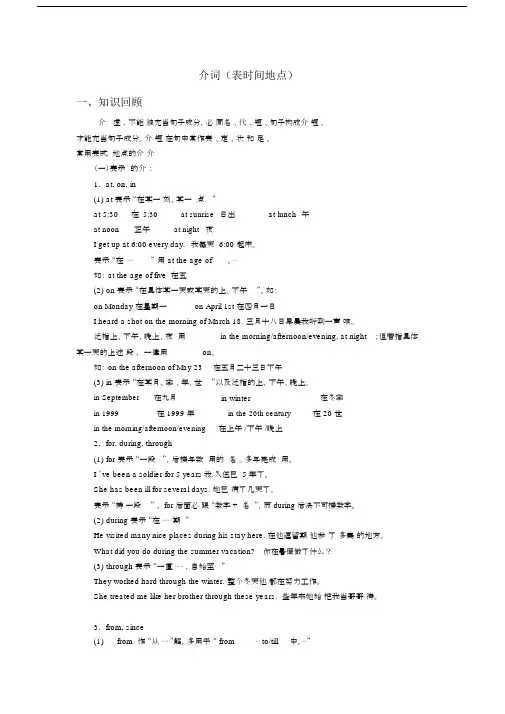
介词(表时间地点)一、知识回顾介虚,不能独充当句子成分,必同名、代、短、句子构成介短,才能充当句子成分。
介短在句中常作表、定、状和足。
常用表式地点的介介(一)表示的介:1. at, on, in(1)at 表示“在某一刻、某一点”at 5:30 在5:30 at sunrise 日出at lunch 午at noon 正午at night 夜I get up at 6:00 every day.我每天6:00起床。
表示“在⋯⋯” 用at the age of。
⋯如: at the age of five 在五(2)on 表示“在具体某一天或某天的上、下午”。
如:on Monday 在星期一on April 1st 在四月一日I heard a shot on the morning of March 18. 三月十八日早晨我听到一声响。
泛指上、下午、晚上、夜用in the morning/afternoon/evening, at night;但若指具体某一天的上述段,一律用on。
如: on the afternoon of May 23在五月二十三日下午(3)in 表示“在某月、季、年、世”以及泛指的上、下午、晚上。
in September 在九月in winter 在冬季in 1999 在 1999 年in the 20th century 在 20 世in the morning/afternoon/evening 在上午 /下午 /晚上2. for, during, through(1)for 表示“一段”,后接与数用的名。
多与完成用。
I ’ve been a soldier for 5 years我.入伍已 5 年了。
She has been ill for several days. 她已病了几天了。
表示“持一段” , for 后面必跟“数字 +名”,而 during 后决不可接数字。

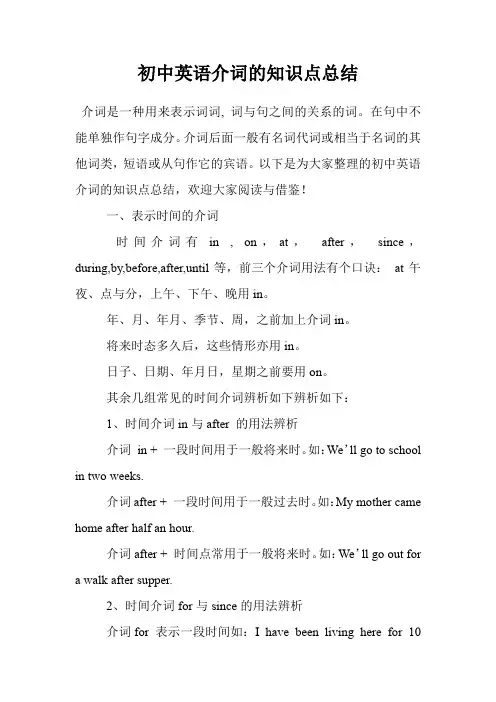
初中英语介词的知识点总结介词是一种用来表示词词, 词与句之间的关系的词。
在句中不能单独作句字成分。
介词后面一般有名词代词或相当于名词的其他词类,短语或从句作它的宾语。
以下是为大家整理的初中英语介词的知识点总结,欢迎大家阅读与借鉴!一、表示时间的介词时间介词有in , on,at,after,since,during,by,before,after,until等,前三个介词用法有个口诀:at午夜、点与分,上午、下午、晚用in。
年、月、年月、季节、周,之前加上介词in。
将来时态多久后,这些情形亦用in。
日子、日期、年月日,星期之前要用on。
其余几组常见的时间介词辨析如下辨析如下:1、时间介词in与after 的用法辨析介词in + 一段时间用于一般将来时。
如:We’ll go to school in two weeks.介词after + 一段时间用于一般过去时。
如:My mother came home after half an hour.介词after + 时间点常用于一般将来时。
如:We’ll go out fora walk after supper.2、时间介词for与since的用法辨析介词for 表示一段时间如:I have been living here for 10years.介词since 表示从过去某一时间以来如:I have been living here since 2000.3、时间介词before与by的用法辨析介词before表示“在…之前”如:He won’t come back before five .介词by表示“到…时为止,不迟于…”如:The work must be finished by Friday.4、时间介词during与for的用法辨析当所指的时间起止分明时用介词during如:He swims every day during the summer.如果一段时间不明确则用介词for如:I haven’t seen her for years.5、时间介词till与until用法的异同till和until用在肯定句中,均可表示“直到…为止”,如:I will wait till(until)seven o'clock.till和until用在否定句中,均可表示“在…以前”或“直到…才”。

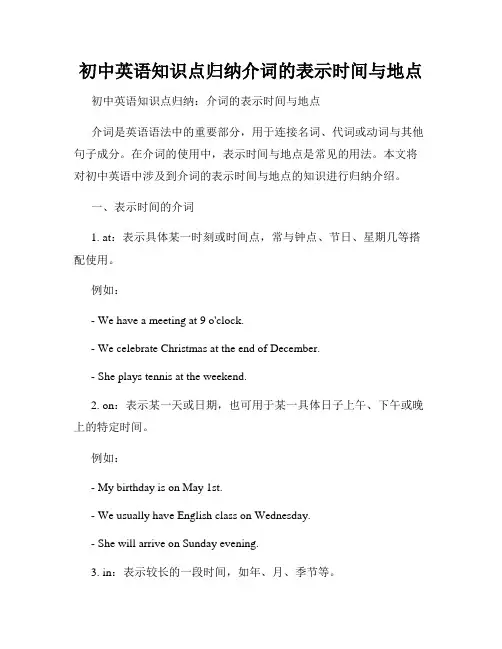
初中英语知识点归纳介词的表示时间与地点初中英语知识点归纳:介词的表示时间与地点介词是英语语法中的重要部分,用于连接名词、代词或动词与其他句子成分。
在介词的使用中,表示时间与地点是常见的用法。
本文将对初中英语中涉及到介词的表示时间与地点的知识进行归纳介绍。
一、表示时间的介词1. at:表示具体某一时刻或时间点,常与钟点、节日、星期几等搭配使用。
例如:- We have a meeting at 9 o'clock.- We celebrate Christmas at the end of December.- She plays tennis at the weekend.2. on:表示某一天或日期,也可用于某一具体日子上午、下午或晚上的特定时间。
例如:- My birthday is on May 1st.- We usually have English class on Wednesday.- She will arrive on Sunday evening.3. in:表示较长的一段时间,如年、月、季节等。
例如:- I was born in 2005.- He will go to Canada in the summer.- They always go skiing in January.4. during:表示在某一段时间内。
例如:- I read a book during the summer vacation.- They have a party during the New Year's holiday.5. for:表示持续的一段时间。
例如:- I have been learning English for five years.- They will stay in the hotel for a week.二、表示地点的介词1. in:表示在一个较大的范围或区域内。
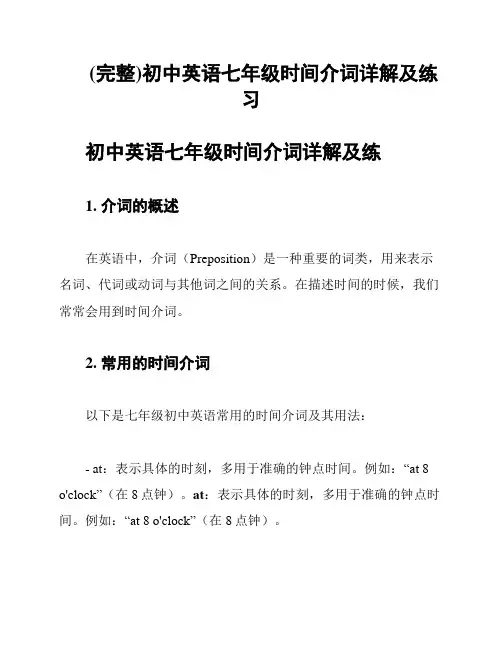
(完整)初中英语七年级时间介词详解及练习初中英语七年级时间介词详解及练1. 介词的概述在英语中,介词(Preposition)是一种重要的词类,用来表示名词、代词或动词与其他词之间的关系。
在描述时间的时候,我们常常会用到时间介词。
2. 常用的时间介词以下是七年级初中英语常用的时间介词及其用法:- at:表示具体的时刻,多用于准确的钟点时间。
例如:“at 8 o'clock”(在8点钟)。
at:表示具体的时刻,多用于准确的钟点时间。
例如:“at 8 o'clock”(在8点钟)。
- on:表示具体的某一天或日期。
例如:“on Monday”(在星期一)。
on:表示具体的某一天或日期。
例如:“on Monday”(在星期一)。
- in:表示较长的时间段,如月份、季节、年份等。
例如:“in July”(在七月)。
in:表示较长的时间段,如月份、季节、年份等。
例如:“in July”(在七月)。
- during:表示某一段时间内发生的事情。
例如:“during the summer vacation”(在暑假期间)。
during:表示某一段时间内发生的事情。
例如:“during the summer vacation”(在暑假期间)。
- for:表示持续的时间。
例如:“for three hours”(持续三个小时)。
for:表示持续的时间。
例如:“for three hours”(持续三个小时)。
练题请根据句意选择适当的时间介词填空:1. I usually go to bed _______ 10 o'clock.2. We have a party _______ Christmas Day.3. They went to the beach _______ their summer vacation.4. Peter studied English _______ three years, and now he speaks it fluently.答案:1. at2. on3. during4. for。
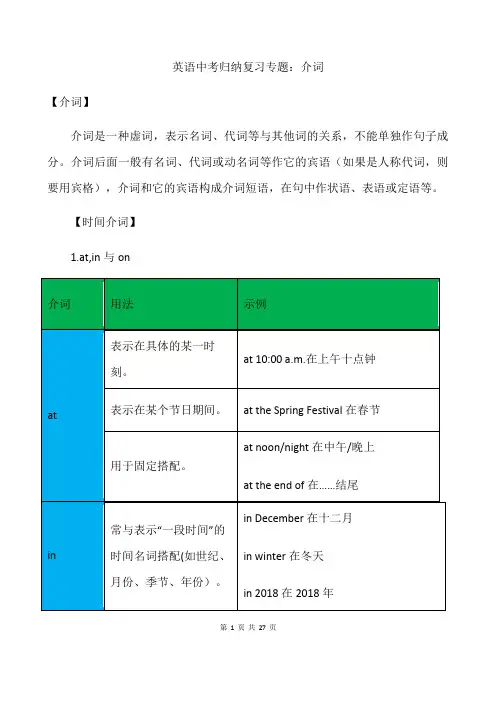
英语中考归纳复习专题:介词【介词】介词是一种虚词,表示名词、代词等与其他词的关系,不能单独作句子成分。
介词后面一般有名词、代词或动名词等作它的宾语(如果是人称代词,则要用宾格),介词和它的宾语构成介词短语,在句中作状语、表语或定语等。
【时间介词】1.at,in与on第 1 页共27 页2.from,since与for第 2 页共27 页3.before与after第 3 页共27 页4.until,during与by第 4 页共27 页【考点训练1】1.China successfully hosted the Belt and Road Forum _____ May,2017. ()A.onB.inC.byD.at2.We usually have the first class ___ 8:00 in the morning. ()A.inB.onC.atD.from3.More and more young people go skating _____ winter. ()A.atB.inC.onD.to4.I’ve had this mobile phone ___ three years. ()第 5 页共27 页A.byB.fromC.forD.since5.His grandfather has been ill ___ last year. ()A.forB.sinceC.fromD.after6.___ April 22nd,people around the world celebrate Earth Day in different ways. ()A.InB.AtC.OnD.For【方位介词】1.at与in第 6 页共27 页2.in,on与to第7 页共27 页【图解助记】3.over,above,on,under与below第8 页共27 页【图解助记】4.其他方位介词第9 页共27 页【考点训练2】1.—Where is Mary flying?—She is flying to France soon.She will arrive ___ Paris on the morning of July 2. ()A.toB.atC.inD.on2.I can’t see Lucy because she is ___ the tree. ()A.in front ofB.behindC.next toD.beside3.Russia lies ___ the north of China. ()A.onB.toC.inD.at第10 页共27 页4.The workers will build a new railroad ___ the two cities. ()A.amongB.inC.betweenD.at5.—Oh,my God! I’ve left my keys in the room.I’ll have to get in ___ the window. —It’s dangerous.You’d better wait for your dad to come back. ()A.past B.over C.across D.through【方式介词】第11 页共27 页考点训练3】用适当的方式介词填空。
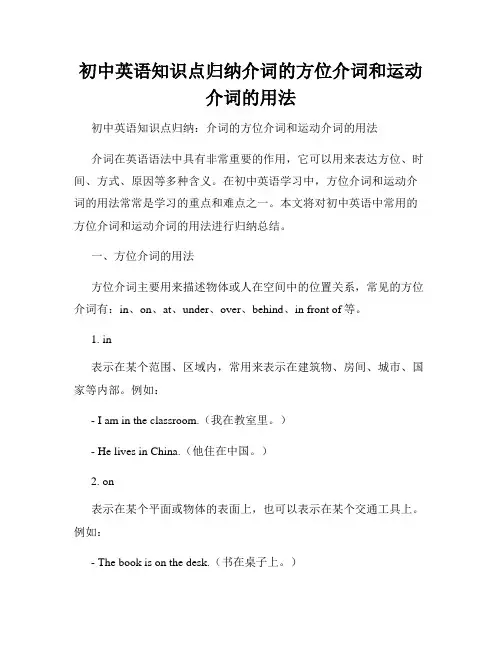
初中英语知识点归纳介词的方位介词和运动介词的用法初中英语知识点归纳:介词的方位介词和运动介词的用法介词在英语语法中具有非常重要的作用,它可以用来表达方位、时间、方式、原因等多种含义。
在初中英语学习中,方位介词和运动介词的用法常常是学习的重点和难点之一。
本文将对初中英语中常用的方位介词和运动介词的用法进行归纳总结。
一、方位介词的用法方位介词主要用来描述物体或人在空间中的位置关系,常见的方位介词有:in、on、at、under、over、behind、in front of等。
1. in表示在某个范围、区域内,常用来表示在建筑物、房间、城市、国家等内部。
例如:- I am in the classroom.(我在教室里。
)- He lives in China.(他住在中国。
)2. on表示在某个平面或物体的表面上,也可以表示在某个交通工具上。
例如:- The book is on the desk.(书在桌子上。
)- We are on the bus.(我们在公交车上。
)3. at表示在某个具体的地点或时间上。
例如:- She is waiting for me at the bus stop.(她在公交车站等我。
)- We often have dinner at home.(我们经常在家吃晚饭。
)4. under表示在某物或某个位置的下方。
例如:- The cat is under the table.(猫在桌子下。
)- The book is under the bed.(书在床下。
)5. over表示在某物或某个位置的上方。
例如:- The bird is flying over the house.(鸟在房子上方飞翔。
)- The blanket is over the child.(毯子在孩子上面。
)6. behind表示在某物或某个位置的后方。
例如:- The tree is behind the house.(树在房子后面。
(完整word版)方位介词初中英语亲爱的读者:本文内容由我和我的同事精心收集整理后编辑发布到文库,发布之前我们对文中内容进行详细的校对,但难免会有错误的地方,如果有错误的地方请您评论区留言,我们予以纠正,如果本文档对您有帮助,请您下载收藏以便随时调用。
下面是本文详细内容。
最后最您生活愉快 ~O(∩_∩)O ~表示位置的介词有:at, in, by, near, between, under表示方向的介词有:to, into, out, out of, across, along, through1 at表示在某地点,强调在某个位置点例:I met her at the school gate this morning. 我今天早上在校门口遇见了她。
at也用于街道号码前例:She lives at 78 Nanjing Road. 她住在南京路78号。
She lives on Nanjing Road. 她住在南京路。
(街道前无号码时用on)She lives in Queen Street. 她住在女王街。
(住在某大街用in)2 in表示“在某区域内,在一个空间的内部,在……里面”例:She was born in Nanjing. 她生于南京。
提示:两个地名连用时,小的用at,大的用in.例:He arrived at London in England last week. 他上周到达英国伦敦。
They will meet at Washington in America. 他们将在美国华盛顿会面。
3 on表示“在……上”,并与之相接触例:He put the dictionary on the desk. 他把词典放在桌子上。
比较英国英语和美国英语的不同介词用法:在路上on the road (美)in the road (英)在街上on the street (美)in the street (英)在周末on the weekend (美)at the weekend (英)在这个队on the team (美)in the team (英)4 under和below表示“在……的正下方”,指垂直上下。
在英语中,精确到年月日的表达通常需要使用介词来描述时间关系。
以下是常用的介词及其用法,可以帮助你精确到年月日:1. "on":通常用于表示具体的某一天或某一天的某个时间点。
例如,“他们在上周五晚上在公园里相遇了。
”2. "in":通常用于表示一段时间或某个时间段内的某一天。
例如,“他们在两周后在会议室里开会。
”3. "at":通常用于表示特定的时间点,如几点钟或某个特定的日期。
例如,“他在周二下午三点钟到达办公室。
”4. "during":用于描述某个时间段内的某一天或某一天的某个部分。
例如,“他们在旅行期间参观了当地的历史博物馆。
”5. "before" 和"after":用于描述时间顺序,表示在某个时间点之前或之后发生的事情。
例如,“她在工作之前先做了一些家务。
”6. "next" 和"last":用于描述接下来的或最后的一天。
例如,“下周三是他的生日,我们将在那里庆祝。
”7. "this" 和"last"(以及其他一些限定词):通常用于指代当前的时间或事件。
例如,“今天晚上我们会吃晚饭,并在这个城市里观光。
”下面是一些关于这些介词更详细的例子和解释:* "They met on Christmas Eve in a park."(他们在平安夜的公园里相遇。
)在这个例子中,“on Christmas Eve”表示在圣诞节前夕,而“in a park”则表示在公园里。
* "They met in the office two weeks later."(他们在两周后在会议室里见面。
)在这个例子中,“in the office”表示在办公室里,而“two weeks later”则表示两周后。
初中英语语法:英语介词口诀详解在初中英语学习中,语法是一个重要的部分,而介词的运用更是让许多同学感到头疼。
不过,别担心,今天我们就来通过一些口诀详细地解读一下初中英语中的介词。
一、关于时间的介词“in 年 in 月 in 季,on 日 on 号 on 星期”,这是我们首先要记住的口诀。
比如说,“in 2023”(在 2023 年),“in May”(在五月),“in spring”(在春天);而“on Monday”(在星期一),“on June 1st”(在 6 月 1 日),“on a sunny day”(在一个晴朗的日子)。
但要注意,如果具体到某一天的上午、下午或晚上,就要用“on”。
例如,“on the morning of June 1st”(在 6 月 1 日的上午)。
“at 用于时刻前,黎明午夜和点分”。
“at six o'clock”(在六点钟),“at noon”(在中午),“at midnight”(在午夜)。
二、关于方位的介词“in 在里,on 在上,at 表示小地点”。
“in the room”(在房间里),“on the table”(在桌子上),“at the bus stop”(在公交车站)。
“between 两者之间,among 三者或以上之中”。
例如,“The ball is between the two chairs”(球在两把椅子之间。
)“He is the tallest among the students”(他是学生中最高的。
)“in front of 外部的前面,in the front of 内部的前面”。
“There is a tree in front of the house”(房子前面有一棵树。
)“The teacher i s standing in the front of the classroom”(老师站在教室的前面。
时间介词知识精讲介词是一种“媒介”词,是用来表示句子中某一个词或短语与另外一个词或短语之间的关系的词。
一、表“在……时”的时间介词二、常见时间介词辨析1. in和after2. since和for3. by和till/ until三点剖析一、考点:时间in/ on/ at介词的用法。
二、重难点:时间介词的辨析及用法。
时间介词是中考的考查重点。
时间介词的中考题主要以单项选择以及完形填空等题型来考查。
注意:during表示事件发生在何时(when),意为“在……期间内”的行为或状态。
in 表示时间段,相当于during,但是注意在选择的时候一定要优先选择during。
例:They visited many cities during their stay in China.他们在中国期间,游览了许多城市。
题模精讲题模一表“在…时”的时间介词例1.1、He often goes to school by bike _________ the morning.A、a tB、i nC、o nD、f or例1.2、They started off _________ an autumn afternoon.A、a tB、i nC、o nD、d uring例1.3、用适当的时间介词填空。
I often got up _________ 6 o’clock when I worked in the company _________2008.题模二常见时间介词辨析例2.1、Shanghai Disneyland has started to be built and it will beopen_________ five years.A、i nB、f orC、f romD、b efore例2.2、My uncle has worked at this factory _________ five years.A、s inceB、f orC、a fterD、u ntil例2.3、He lived with his parents _________ he graduated from college.A、d uringB、f orC、b yD、u ntil随堂练习随练1.1、My uncle has worked at this factory _________ five years.A、sinceB、forC、afterD、until随练1.2、Both Mary and Betty will get married this year. Mary is going to begin their honeymoon _________Christmas while Betty _________ New Year’s Day.A、on; onB、at; inC、at; onD、by; on随练1.3、根据句意,用适当的时间介词填空。
They will have a party _________ the afternoon _________ June 1st.随练1.4、Mary is flying to France soon. She will arrive in Pairs _________ the morning of July 9.随练1.5、Our English teacher often get to school _________ 7:00 in the morning.随练1.6、He lives with us _________ these years.随练1.7、Suffering from the terrible earthquake, the victims often awake several times _________ a cold night.A、onB、atC、inD、during随练1.8、I’d like to call on my uncle _________ my stay in Beijing this summer.A、duringB、inC、atD、for随练1.9、There was a terrible storm _________ the night; it rained _________ four or five hours.A、during; duringB、during; forC、for; forD、for; during随练1.10、--- _________ you _________ a new phone yet?--- Yes. I _________ it a moment ago.A、Did, buy; boughtB、Have, bought; boughtC、Have, bought; buyedD、Will, buy; buy随练1.11、My father didn’t sleep _________ he finished his work.A、beforeB、afterC、sinceD、until随练1.12、--- Do you often go to Shanghai?--- Yes, I have been there twice _________ Christmas.A、forB、sinceC、atD、on随练1.13、He hasn’t heard from her friend _________ a long time.随练1.14、_________ the end of this term, we had learned 1000Englsh words.随练1.15、I waited for my mother _________ 10 o’clock.方位介词知识精讲一、表“在……位置”的介词at, in二、表“在……方位”的介词1. in, on, to2. above, over, on “在……上”3. under, below “在……下”三、常见方位介词辨析1. between和among2. across和through3. along和over4. near, by, beside5. in front of 和in the front of6. in the tree和on the tree三点剖析一、考点:介词虽然是一种虚词,自身不能单独充当句子成分,但它是英语中最活跃、最难掌握的词类之一。
中考对介词的考点主要集中在介词的基本用法上。
地点或方位介词在中考单选和完形里面也是多次出现。
二、重难点:注意近义词词组的辨析,在使用时要注意根据语境和语法去选择。
比如:1.表“在……位置”的介词at, in;2. 表“在……方位”的介词:1) in, on, to;2) above, over, on 在……上;3) under, below 在……下。
3. 常见方位介词辨析:1) between和among;2) across和through;3) along和over;4) near, by和beside;5) in front of 和in the front of;6) in the tree 和on the tree。
题模精讲题模一表“在…位置”的介词例1.1、Maria is leaving for France soon by air. She’ll arrive _________ Paris on the morning of August 8th.A、a tB、i nC、o nD、t o例1.2、Please wait for me _________ the bus station.A、a tB、i nC、t oD、u nder题模二表“在…方位”的介词例2.1、China lies _________ the east of Asia and _________ the north of Australia.A、t o; toB、i n; toC、t o; inD、i n; on例2.2、The sun rises _________ the horizon.A、o verB、o nC、a boveD、u nder例2.3、I want to have a rest _________ the tree.A、b lewB、u nderC、a boveD、o ver题模三常见方位介词辨析例3.1、用适当的方位介词填空。
His grades in the exam put him _________ the top students in his class.例3.2、---Excuse me, where is the bookstore?---Go _________ the bridge. You’ll see it on your left.A、o nB、c rossC、a crossD、t hrough例3.3、Sean has formed the habit of jogging _________ the tree-lined avenue for two hours every day.A、b etweenB、a longC、b elowD、w ithThere are some apples _________ the tree and some birds are singing _________ the tree.A、o n; inB、i n; onC、o n; onD、i n; in随堂练习随练2.1、根据汉语提示,用正确的介词完成句子。
--- Where is you Chinese teacher?--- He’s _________ the meeting room. (在会议室)随练2.2、Alan found a bird’s nest __________ the tree. (在树上)随练2.3、He said that he would meet us _________ the station.A、onB、atC、ofD、to随练2.4、He lives _________ England, _________ London.A、to; inB、at; inC、i n; atD、in; in随练2.5、Taiwan is a beautiful island and it’s _________ the east of Fujian.A、inB、onC、toD、atThe apples rotted (烂) _________ the tree.A、inB、onC、aboveD、over随练2.7、Taiwan is a beautiful island and it’s _________the east of Fujian.A、i nB、o nC、t oD、a t随练2.8、There is a cup _________ the desk. (在桌上)随练2.9、Raise your hands _________ your head. (举过你的头)随练2.10、They have designed a system which pumps up water from 70m _________ ground. (地下70米处)随练2.11、_________ the bridge, you will see a big building. (穿过这座桥)随练2.12、He left the table to stand _________ the two men. (站在两个男人之间)随练2.13、Newman walked _________ the street alone. (沿着街道)随练2.14、The sun rose _________ the horizon.A、overB、aboveC、blewD、onThere is a striped sofa _________ the wall.A、inB、onC、alongD、across随练2.16、I have an uncle. He lives _________ Shanghai. (住在上海)随练2.17、China is _________ the west of Japan. (在日本西部)自我总结能力拓展拓展1、A terrible earthquake happened in Nepal _________ April 25th, 2015.A、atB、inC、onD、to拓展2、We usually have breakfast _________ 8:00 every day.A、ofB、inC、onD、at拓展3、I lived with my grandparents _________ 2010.A、atB、inC、onD、to拓展4、The girl left her home _________ a cold winter evening.A、onB、inC、atD、of拓展5、Lucy lived in Beijing from 2010 _________ 2015.A、atB、toC、onD、in拓展6、--- How soon will his father come back from London? --- _________ a week.A、atB、afterC、forD、in拓展7、A、o nB、a tC、i nD、o f拓展8、Miss Brown has taught physics _________ twenty years.A、forB、sinceC、untilD、after拓展9、You _________ get off the bus _________ it stopped.A、didn’t; beforeB、didn’t; untilC、have been; afterD、have gone; until 拓展10、My son has been ill _________ Last Friday.A、forB、inC、sinceD、at拓展11、根据汉语提示,用正确的方位介词完成句子--- Where are my books?--- They are _________ the sofa.(沙发上)拓展12、He lives _________ Paris. (住在上海)拓展13、Viet Nam (越南) is _________ the south of China. (位于中国南部)拓展14、An airplane flew _________ our heads. (头上飞过)拓展15、——Is your father home?——No, he’s working late ____ the office.A、o nB、a tC、o fD、t o拓展16、Don’t drive so fast! We must slow down when we drive _________ the tunnel. (穿过隧道)拓展17、We have arranged work _________ the students. (在学生当中)拓展18、There is a small village _________ the mountain. (山脚下)拓展19、My mom has a habit of jogging _________ the Jinchuan River for an hour in the morning. (沿着金川河)拓展20、---Is your father home?---No, he’s working late _________ the office.A、onB、atC、ofD、to拓展21、Xingtai is located __________ the north of Hebei.A、inB、onC、toD、off拓展22、--- Do you see the sign “No Smoking”_________ the wall?---Sorry, I didn’t.A、aboutB、overC、inD、on拓展23、He arrived _________ 9:00 and 10:00 last night.A、amongB、betweenC、onD、in拓展24、I’d like to trek _________ the jungle, because I like exciting vacationsA、throughB、acrossC、crossD、in拓展25、The pay phone is _________ the library.A、in front ofB、in the front ofC、on the front ofD、on front of。